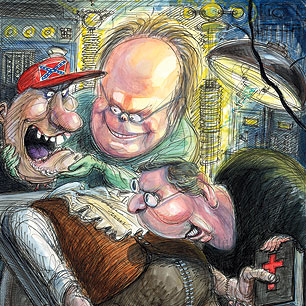
In the latest issue of Rolling Stone, Matt Taibbi takes an in-depth look at the Tea Party. He provides a history of the movement and gives an account of its corporate sponsorship, as well as — most crucially — its absorption by the Republican party. It’s a grim story, but delivered with Taibbi’s characteristic knuckle-sandwich style. The bad news is that the demagoguery that drives the Tea Party movement has given the Republicans a big boost for the midterms. The good news is that the movement is also doomed: too many of its members are old and white and don’t live anywhere near a world of verifiable fact. They are paranoid, resentment-driven and about as intellectually dishonest as it is possible to be, if the term “intellectually” can even be applied here. And, although they haven’t yet figured it out, they’ve already been betrayed by their corporate puppet-masters. The article, “Tea and Crackers,” can be read in its entirety here. A sample:
So how does a group of billionaire businessmen and corporations get a bunch of broke Middle American white people to lobby for lower taxes for the rich and deregulation of Wall Street? That turns out to be easy. Beneath the surface, the Tea Party is little more than a weird and disorderly mob, a federation of distinct and often competing strains of conservatism that have been unable to coalesce around a leader of their own choosing. Its rallies include not only hardcore libertarians left over from the original Ron Paul “Tea Parties,” but gun-rights advocates, fundamentalist Christians, pseudomilitia types like the Oath Keepers (a group of law- enforcement and military professionals who have vowed to disobey “unconstitutional” orders) and mainstream Republicans who have simply lost faith in their party. It’s a mistake to cast the Tea Party as anything like a unified, cohesive movement — which makes them easy prey for the very people they should be aiming their pitchforks at. A loose definition of the Tea Party might be millions of pissed-off white people sent chasing after Mexicans on Medicaid by the handful of banks and investment firms who advertise on Fox and CNBC.
The individuals in the Tea Party may come from very different walks of life, but most of them have a few things in common. After nearly a year of talking with Tea Party members from Nevada to New Jersey, I can count on one hand the key elements I expect to hear in nearly every interview. One: Every single one of them was that exceptional Republican who did protest the spending in the Bush years, and not one of them is the hypocrite who only took to the streets when a black Democratic president launched an emergency stimulus program. (“Not me — I was protesting!” is a common exclamation.) Two: Each and every one of them is the only person in America who has ever read the Constitution or watched Schoolhouse Rock. (Here they have guidance from Dick Armey, who explains that the problem with “people who do not cherish America the way we do” is that “they did not read the Federalist Papers.”) Three: They are all furious at the implication that race is a factor in their political views — despite the fact that they blame the financial crisis on poor black homeowners, spend months on end engrossed by reports about how the New Black Panthers want to kill “cracker babies,” support politicians who think the Civil Rights Act of 1964 was an overreach of government power, tried to enact South African-style immigration laws in Arizona and obsess over Charlie Rangel, ACORN and Barack Obama’s birth certificate. Four: In fact, some of their best friends are black! (Reporters in Kentucky invented a game called “White Male Liberty Patriot Bingo,” checking off a box every time a Tea Partier mentions a black friend.) And five: Everyone who disagrees with them is a radical leftist who hates America.
It would be inaccurate to say the Tea Partiers are racists. What they are, in truth, are narcissists. They’re completely blind to how offensive the very nature of their rhetoric is to the rest of the country. I’m an ordinary middle-aged guy who pays taxes and lives in the suburbs with his wife and dog — and I’m a radical communist? I don’t love my country? I’m a redcoat? Fuck you! These are the kinds of thoughts that go through your head as you listen to Tea Partiers expound at awesome length upon their cultural victimhood, surrounded as they are by America-haters like you and me or, in the case of foreign-born president Barack Obama, people who are literally not Americans in the way they are.
